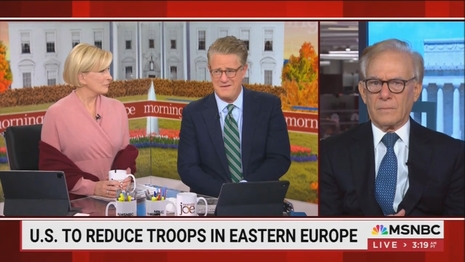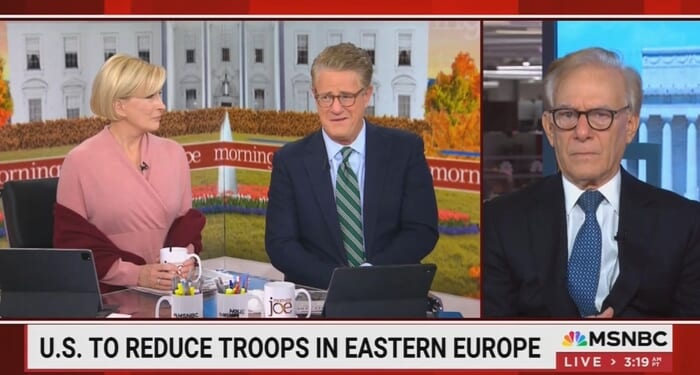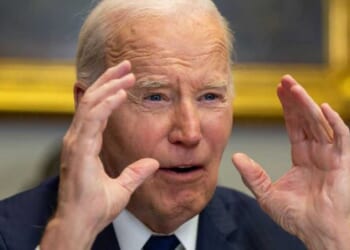 MSNBC contributors on Thursday’s Morning Joe couldn’t comprehend why the Trump administration would possibly want to redirect military resources and manpower away from Europe and towards Latin America and the Pacific. The disbelief included insinuations of inviting Russian aggression to reasserting claims of President Trump not really addressing the true source of narcotics trafficking.
MSNBC contributors on Thursday’s Morning Joe couldn’t comprehend why the Trump administration would possibly want to redirect military resources and manpower away from Europe and towards Latin America and the Pacific. The disbelief included insinuations of inviting Russian aggression to reasserting claims of President Trump not really addressing the true source of narcotics trafficking.
Co-host Joe Scarborough asked Washington Post columnist David Ignatius if the rearrangement of priorities was an invitation for Putin to reinvigorate his wilting campaign into Ukraine:
SCARBOROUGH: Unfortunately, the timing of it just couldn’t be worse […] you’re doing this at the same time you’re trying to push Vladimir Putin back in Europe. This sends exactly the wrong message, doesn’t it?
IGNATIUS: It does to Russia. My sense is that Trump really is turning our national security priorities upside down. Russia is an increasingly aggressive threat to Europe and by extension the United States.
Russia has posed a nuclear threat to the U.S., not a fiscal or land threat (which has become more apparent with the fact they failed conquer a neighbor), and our military presence inside or outside of Europe couldn’t change that. Not to mention Trump just began matching launch threats.
Ignatius further downplayed the danger posed by adversaries geographically close to the U.S. and didn’t mention the hundreds of thousands of deaths directly linked to drugs: “The threat in Latin America is limited. Even Trump describes it in terms of a narcotics problem. It’s not usually seen as national security.”
Scarborough believed the shift to be “bizarre,” and claimed everyone shared in his opinion that the newfound reasons for focusing on the western hemisphere were farcical:
The suggestion that you’re going to stop fentanyl trafficking and the trafficking of cocaine and other drugs by blowing up boats off the coast of Venezuela is just complete lunacy, and everybody knows it. Democrats and Republicans alike know they’re lying. This isn’t about a drug war.
The Trump administration has been making separate efforts at addressing the issues stemming from Mexico, so for the left-wing media to claim that Trump was ignoring the real source was disingenuous. It’s a multifaceted effort at reclaiming ultimate regional dominance.
Ignatius repeated the Wall Street Journal’s oh-so clever “Donroe Doctrine” line and insinuated Trump was taking the U.S. backwards:
… this is about flexing your muscles in your own hemisphere […] And Trump, as in so many other ways, seems to be moving back to the 19th century and those definitions of American foreign policy. At a time when U.S. interests are so clearly threatened in Europe by a very aggressive advancing Russia, and in Asia by a growing Chinese threat, all this focus on Central Latin America is just hard to understand.
Richard Haass, the former president of the Council on Foreign Relations, was on the panel and played dumb about the pivot to Asia. “Remember, Joe, for years we would talk about the pivot to Asia? What we’re seeing is a pivot a little bit out of Europe continuing not necessarily a pivot to Asia anymore, we’re seeing a pivot to the western hemisphere. The greater use of the military here at home,” he huffed.
Of course, he was overlooking how America was strengthening its military relationships with regional allies like Japan, South Korea, the Philippines, and Taiwan.
Trump has successfully pressured most of NATO into paying its fair share in securing against local antagonists, and he just finished a trip where he met with Asian allies and settled down trade tensions with China. In other words, the shift in military focus is quite easy to understand, actually.
The transcript is below. Click “expand” read:
MSNBC’s Morning Joe
October 30, 2025
6:14:55 a.m. EST(…)
WILLIE GEIST: Some other news this morning. Two top Republicans on Capitol Hill are criticizing the Pentagon’s plan to cut the number of American troops deployed to Eastern Europe. Senator Roger Wicker and Congressman Mike Rogers, who chair their respective Armed Services Committees, say the move jeopardizes the U.S. relationship with key allies on NATO’s eastern flank.
Around 700 troops with the 101st Airborne Division will be rotated out of Germany, Romania and Poland as the Trump administration shifts its focus toward Latin America and Asia. The Republican chairmen write in part, “This decision also sends the wrong signal to Russia at the very moment President Trump is applying pressure to force Vladimir Putin to come to the table to achieve a lasting peace in Ukraine.”
JOE SCARBOROUGH: I mean, it is, David Ignatius, why that’s a statement straight out of, the 19th century, you know, the Monroe Doctrine alive and well in Pete Hegseth’s head. Unfortunately, the timing of it just couldn’t be worse as the Republican Armed Services chairmen on the House and the Senate both said, you’re doing this at the same time you’re trying to push Vladimir Putin back in Europe. This sends exactly the wrong message, doesn’t it?
DAVID IGNATIUS: It does to Russia. My sense is that Trump really is turning our national security priorities upside down. Russia is an increasingly aggressive threat to Europe and by extension the United States. The threat in Latin America is limited. Even Trump describes it in terms of a narcotics problem. It’s not usually seen as national security. You know, we’ll have to see whether the Congress can really challenge this.
(…)
6:19:14 a.m. EST
RICHARD HAASS: I guess I’ll make a larger point, also, with the troops potentially out of Europe and the question about Asia. This administration, at least the Pentagon, is on the verge, it seems, of a major reset in American foreign policy. Remember, Joe, for years we would talk about the pivot to Asia?
SCARBOROUGH: Right.
HAASS: What we’re seeing is a pivot a little bit out of Europe —
SCARBOROUGH: Right.
HAASS: — continuing not necessarily a pivot to Asia anymore, we’re seeing a pivot to the western hemisphere. The greater use of the military here at home, the greater use of the military in the western hemisphere. This is enormously consequential. This is really a redirection of American military resources. This has got to be debated.
SCARBOROUGH: But, I mean, and it’s —
HASS: — which is to say it’s questionable.
MIKA BRZEZINKSI: Right.
SCARBOROUGH: It’s bizarre. I mean, you look, David Ignatius, at where the drugs are coming in from Central and South America, the vast number of them are not coming from Venezuela. The suggestion that you’re going to stop fentanyl trafficking and the trafficking of cocaine and other drugs by blowing up boats off the coast of Venezuela is just complete lunacy, and everybody knows it. Democrats and Republicans alike know they’re lying. This isn’t about a drug war.
IGNATIUS: But as Richard rightly says, this is about flexing your muscles in your own hemisphere. The Wall Street Journal cleverly described this as the “Donroe Doctrine,” playing off the Monroe Doctrine, which asserted that the — this hemisphere, North and South America, is our space and nobody’s allowed to infringe on it.
And Trump, as in so many other ways, seems to be moving back to the 19th century and those definitions of American foreign policy. At a time when U.S. interests are so clearly threatened in Europe by a very aggressive advancing Russia, and in Asia by a growing Chinese threat, all this focus on Central Latin America is just hard to understand.
SCARBOROUGH: Yeah.
(…)

















